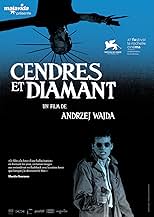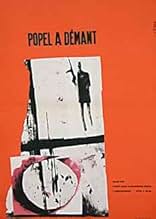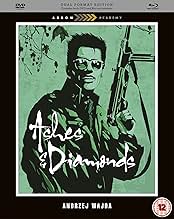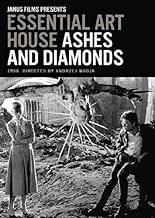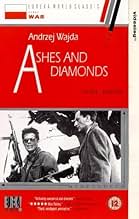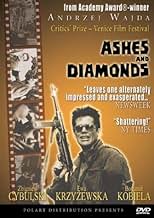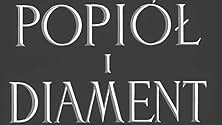Alla fine della seconda guerra mondiale e dell'occupazione tedesca, la resistenza polacca e le forze russe si rivoltano nel tentativo di prendere il comando della Polonia comunista.Alla fine della seconda guerra mondiale e dell'occupazione tedesca, la resistenza polacca e le forze russe si rivoltano nel tentativo di prendere il comando della Polonia comunista.Alla fine della seconda guerra mondiale e dell'occupazione tedesca, la resistenza polacca e le forze russe si rivoltano nel tentativo di prendere il comando della Polonia comunista.
- Regia
- Sceneggiatura
- Star
- Nominato ai 2 BAFTA Award
- 1 vittoria e 2 candidature totali
- Stefka
- (as Barbara Kraftówna)
- Barmaid Lili
- (as Z. Czerwinska)
- Franek Pawlicki
- (as W. Grotowicz)
- Jurgieluszka
- (as I. Orzewska)
- Smolarski
- (as M. Loza)
- Puciatycka
- (as H. Siekierko)
Recensioni in evidenza
The film shows the lost youth of Poland struggling to find a way to leave this vicious upbringing and return to a normality which they often didn't ever have.
The film's hero wants to return to being a student and having romances and friends after years of fighting for the Polish underground (this is why he wears sunglasses, because his eyesight was damaged fighting in tunnels during the Warsaw Uprising), however he has a mission to kill a communist officer...
The film is amazing, the imagery reflects the detruction and sorrow of this lost generation. The direction and acting are superb. Like a previous poster, however, I was a little dis-satisfied with the ending, which differed from the book. That is a trivial point, though.
If you know nothing about how the movie got made, this seems to be the whole purpose. But there are other points. In a mini-documentary about the movie, Andrzej Wajda and his collaborators explain how the novel on which the movie is based had Szczuka as the main character. Wajda not only moved the focus to Maciek - and gave him sort of a James Dean look - but also stressed the scene where Maciek talks with the man who fought in the Spanish Civil War. Apparently, fighting like the man did is a Polish tradition. Therefore, the film likely appeals to the Poles in almost every way; the perfect Polish movie, if you will.
Although I've never seen any of Andrzej Wajda's other movies - hell, I'd never heard of him until the Academy Awards gave him an honorary Oscar - I staunchly recommend this one. One can clearly see how he used the movie to subtly challenge the Soviet domination of his country (of course, they couldn't openly say anything against the USSR). Poland's pro-Soviet government had approved the movie, but didn't want to let it outside Poland. Wajda got some people to smuggle it out of the country, and it reached much of the world. Probably the most amazing scene is the end. I won't spoil the end, but I'll note that blood on a white sheet looks a bit like Poland's flag (a nationalistic statement).
All in all, a great movie. Andrzej Wajda has every reason to be proud of it.
Lo sapevi?
- QuizQuarto potere (1941) - and Gregg Toland's cinematography in particular - was a huge influence on Andrzej Wajda at the time. Like Toland, the first thing the film's cinematographer Jerzy Wójcik did was convince production designer Roman Mann to include ceilings in all the sets.
- BlooperGlasses of vodka are set alight which burn for an unnaturally long length of time and with a bigger flame than expected, suggesting a purer fuel was used in the film, such as petrol. Moreover, when the final flame dies (c.41 minutes) no liquid remains in the glass. Only the alcohol content is flammable in any glass of spirit and a residue of water would be left behind with even the very strongest of Polish vodkas.
- Citazioni
Krystyna: Look. An old crypt. An inscription. "So often are you as a blazing torch with flames of burning hemp falling about you flaming, you know not if the flames bring freedom or death, consuming all that you most cherish. Will only ashes remain, and chaos whirling into the void." The letters are blurred. I can't read it.
Maciek Chelmicki: It's by Norwid. "Or will the ashes hold the glory of a starlike diamond, the Morning Star of everlasting triumph."
Krystyna: That's beautiful. "Or will the ashes hold the glory of a starlike diamond..." And what are we?
Maciek Chelmicki: You - are definitely a diamond.
- ConnessioniEdited into CzechMate: In Search of Jirí Menzel (2018)
- Colonne sonoreCzerwone maki
(Red Poppies) (uncredited)
Music by Alfred Schütz and lyrics by Feliks Konarski
Performed by Grazyna Staniszewska
I più visti
- How long is Ashes and Diamonds?Powered by Alexa
Dettagli
Botteghino
- Budget
- 6.070.000 PLN (previsto)
- Tempo di esecuzione
- 1h 43min(103 min)
- Colore
- Mix di suoni
- Proporzioni
- 1.66 : 1

